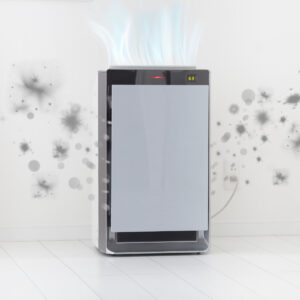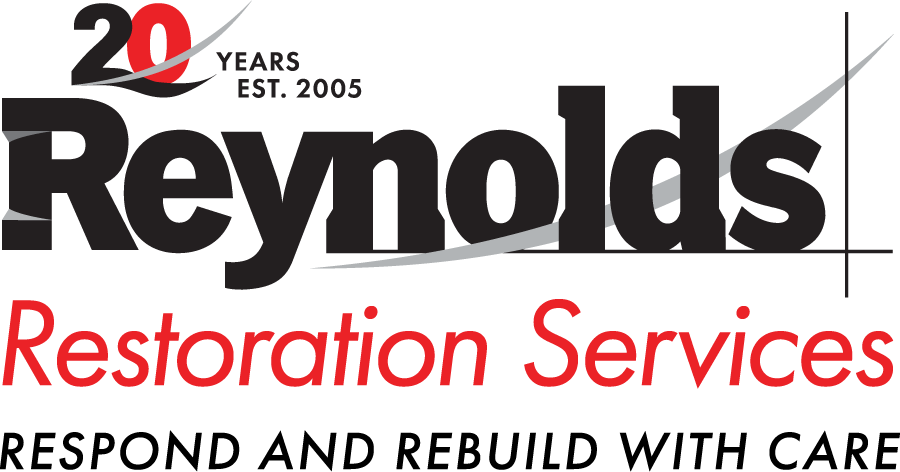
Black mold in particular is problematic for a homeowner. A black mold problem can result in health issues as well as damages to furniture, walls, carpets, and other items in a building or office. Other types of harmful mold include aspergillus and fusarium.
While there is no way to completely eliminate mold from your environment, there are some ways to reduce the number of mold particles in the air, including the use of air purifiers.
How Air Purifiers Work
Air purifiers clean the air and remove airborne pollutants such as allergens, toxins, and mold spores. They work differently from diffusers and humidifiers which add particles to the air. Since mold needs humidity to grow, humidifiers can actually contribute to a mold issue.
There are different kinds of air purifiers available for home and commercial use that use different technologies. The most common types of air purifiers are:
- HEPA filters
- Activated carbon filters
- UV technology
- Negative ion
HEPA (high-efficiency particulate air) purifiers push air through a fine-mesh filter that traps microscopic mold spores. True HEPA filters capture 99.97% of particles larger than .3 microns. This includes mold spores which are between two and ten microns in diameter. Air purifiers with HEPA filters require routine maintenance. Filters should be changed every 6-12 months to work properly.
Air purifiers with activated carbon filters absorb airborne toxins and particles. Activated carbon is extremely porous and has a large surface area for absorption. Activated carbon technology is effective for capturing odors and musty smells.
UV technology works differently than other air purifiers. UVGI (ultraviolet germicidal irradiation) air purifiers use short-wave UV C light to inactivate airborne pathogens. UV air purifiers do not trap particulate matter such as dust, dander, or pollen and are not effective on some strains of mold spores.
Negative ion purifiers create negative oxygen atoms or ions. These ions attach to airborne particles and cause them to settle on a collector plate or other positively charged surfaces such as a floor, table, or furniture. Negative ion purifiers do not actually remove the contaminants, just cause them to collect together on a surface. Negative ion purifiers also emit ozone which can cause health concerns.
Will An Air Purifier Get Rid of Mold?
It’s important to understand that an air purifier will not solve an existing mold issue. If you have mold growing in your home or office, it needs to be completely remediated either by removing the mold yourself or working with a professional like Reynolds Restoration Services.
Mold can be removed by using several household cleaning items including hydrogen peroxide, white vinegar, baking soda, borax, or a bleach/water solution. Never combine bleach with any other chemicals – this can be dangerous.
If mold is growing on a soft surface like cloth, carpeting, area rugs, sofas, or foam, the affected area should be discarded and the entire item may even need to be thrown away. Some companies offer cleaning services for mold-infested items. Completely removing an item with mold is important to stop mold from spreading.
The key to preventing mold completely is moisture control. Humidity levels should be kept between 30-50% to prevent mold growth. Leaky air conditioners, damp basements, and leaking roofs all contribute to high humidity and should be fixed to prevent mold growth.
The best air purifier for mold is a HEPA technology air purifier. Again, this alone will not completely remove mold spores from a home. Proper preventative measures should also be included to address mold growth.
In summary, an air purifier will get rid of mold spores, but not get rid of mold growth. Mold growth is best addressed by a professional mold removal professional.
Learn about our Mold Removal Services
Professional Mold Removal
Small areas of mold growth can easily be addressed using common home cleaners. For example, there are many brands of bathroom mold and mildew removers that can quickly and efficiently remove unsightly mold from grout and tile.
When mold growth is extensive in a damp basement or behind drywall, it’s better to have a professional mold removal company that is trained in proper mold remediation and removal procedures. Trained and certified professionals have the right equipment and tools to be able to remove mold and help home and business owners implement preventative measures for future mold growth.
Reputable professional mold removal specialists use commercial-grade mold removal products that are non-toxic and safe for homeowners and their families (including pets). At Reynolds Restoration Services, our approach to mold removal includes:
- Wipe and sanitize surfaces using a non-toxic EPA-approved product.
- Clean fabrics with a HepaVAC. Unlike a standard vacuum, a HepaVAC contains filters to trap and remove small particles like mold spores.
- Use an air scrubber to “scrub” the air to remove mold spores. An air scrubber is a portable filtration system that removes mold from the air.
- If necessary, removal and demo of mold-damaged materials.
Call Reynolds Restoration Services for Your Mold Problems
If you have found mold in your home or business, it’s important to address it as soon as possible. Don’t rely solely on an air purifier to help. Mold can create health issues and even affect your building’s structural integrity.
With more than 15 years of experience treating mold issues, Reynolds Restoration Services is an expert in mold remediation and removal. With offices in Harrisburg and Philadelphia, PA, and Baltimore, MD, our teams can respond quickly and are on call 24/7/365. Contact the experts at Reynolds Restoration Services today. While we hope you don’t need us, our team is standing by and ready to help.

President of Reynolds Restoration Services. Over 20 years of experience in the emergency restoration industry.

